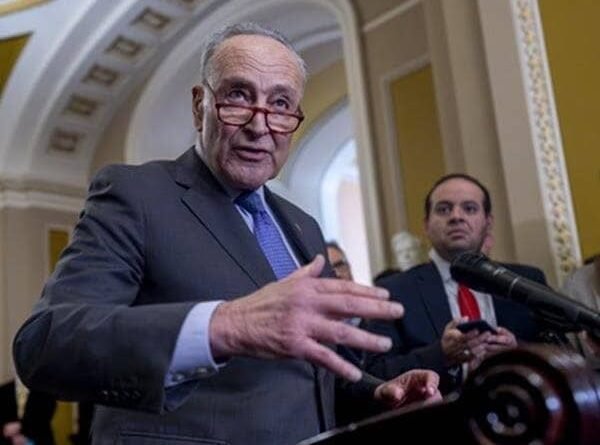Senate Approves $1.2 Trillion Funding Package in Early Morning Vote, Avoiding Partial Shutdown
The Senate approved a $1.2 trillion spending package in the early hours of Saturday morning, marking a significant action nearly six months into the budget year. This action will delay any potential government shutdown until the fall. The bill now awaits President Joe Biden’s signature to become law.
The vote passed with a margin of 74-24. The funding for agencies had expired at midnight, but the White House expressed confidence that the legislation would pass, and as a result, shutdown preparations were ceased by the Office of Management and Budget. This means that federal agencies will not shut down and can continue their normal operations.
Concerns for a possible short-term government shutdown peaked on Friday evening as Republicans and Democrats clashed over proposed amendments to the bill. Any successful amendments would have sent the bill back to the House, which had already adjourned for a two-week recess.
Shortly before midnight, Senate Majority Leader Chuck Schumer announced a breakthrough in negotiations.
“It’s been a long and challenging day, but we have reached an agreement to fund the government,” Schumer stated. “This bipartisan deal is beneficial for the country. It was not an easy process, but our persistence has paid off.”
While funding had already been approved for agencies like Veterans Affairs, Interior, and Agriculture, this week’s bill covers a larger scope, including funding for the Defense, Homeland Security, State departments, and other areas of the general government.
The House passed the bill earlier on Friday with a vote of 286-134, barely reaching the two-thirds majority required for approval. Over 70% of the funds allocated in the bill are designated for defense spending.
House Speaker Mike Johnson faced backlash from Republicans over the content and swift process of the bill. Despite a majority of Republicans voting against it, he defended the bill as the best possible outcome for a divided government.
The vote split showed 101 Republicans in favor of the bill and 112 against it, while 185 Democrats voted for it and 22 against it.
Rep. Kay Granger, the Republican chair of the House Appropriations Committee, relinquished her role after the vote but remains on the committee to offer guidance and mentorship when needed.
Johnson opted for a two-part process for this year’s spending bills to avoid the conventional last-minute omnibus vote that caused resistance among House Republicans. He deemed this process a breakthrough in breaking the omnibus tradition.
Despite the split opinions, most Republicans viewed the bill as inadequate in addressing their policy priorities and involving excessive spending.
Lawmakers took six months to finalize government funding for the current fiscal year due to conservative demands for stricter policy mandates and budget cuts. This led to multiple short-term funding bills to keep agencies operational.
The total discretionary spending for the fiscal year, combining both spending bills, amounts to approximately $1.66 trillion, excluding programs like Social Security, Medicare, and the national debt.
To garner Republican support, Johnson highlighted spending increases for additional detention beds for migrants awaiting immigration proceedings and more Border Patrol agents. Democrats emphasized funding increases for programs like Head Start, cancer research, and Alzheimer’s research.
“We had to work under difficult circumstances and fight against extreme Republican proposals, but we have crafted a bill that serves the country,” stated Sen. Patty Murray, the Democratic chair of the Senate Appropriations Committee.
Sen. Susan Collins, the top Republican on the committee, defended the bill as fiscally conservative and carefully drafted, noting the decreased spending on non-defense programs compared to previous years.
The spending package aligns with an agreement made in May 2023 between Speaker McCarthy and the White House, which set spending limits for two years and extended the debt ceiling until January 2025 to ensure continued government funding.
Shalanda Young, director of the White House Office of Management and Budget, projected that the previous agreement, known as the Fiscal Responsibility Act, would save the government around $1 trillion over the next decade.
Copyright 2024 The Associated Press. All rights reserved. This material may not be published, broadcast, rewritten or redistributed without permission.




